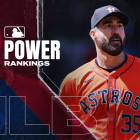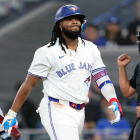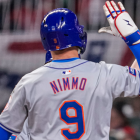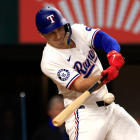The times are such that not so long ago I used a random number generator to simulate the 2020 NCAA Men's Basketball Tournament that never was and posted the results to Twitter.
In an outcome that left me marbled with contempt, Duke prevailed. There's nothing novel about detesting Duke basketball, but I can claim a long grip on such righteousness. In the 1986 final between Louisville and Duke, Danny Ferry marked his team's defeat by clothes-lining Louisville's Jeff Hall as the clock ran out. For me, the serialized run of Duke heels that is still too much with us began at that moment some 34 years ago. So while it's not interesting that I loathe Duke basketball, I am if nothing else tenured at the rituals of it. Should the Blue Devils honor me at some future halftime for being their most veteran hater? Probably, but they shall always be strangers to decency.
Anyhow, in this pretend tournament, the latest episode of Duke villainy came when they defeated top seed Dayton -- those plucky topplers of assumptions -- in the Final Four. Seeing a lamentable blueblood take down a mid-major enjoying a once-in-a-century season and deprive them of a spot in the title game reduced me to a toddler in high dudgeon. So in my imagination, I replaced Dayton head coach Anthony Grant at the podium for the post-game presser.
"What impressed you about what Duke did from a scheme standpoint tonight?"
"What impressed me about Duke was the talent, doggedness, and intelligence on the floor. Nothing they did tactically from the bench was the least bit surprising. In fact, they could've beaten us even worse if they'd made some better rotation decisions in the first half and stopped trying to screw around with a zone. If you're trying to get to me to compliment the guy who coaches Duke, then I guess I can accommodate by saying he's good at hiring assistants who recruit well."
"But in terms of--"
"If you look at the talent he's run through that place over the last few years, it's remarkable that he hasn't managed to win a title in a while. Has any coach over the last half decade or so done less with more than the guy Duke employs? That's rhetorical, so don't bother answering. Anyhow, the talent on the floor impressed me. That concludes the exhaustive list of things that impressed me about Duke tonight."
Typically in journalism, we're discouraged from using the first person -- i.e., saying "I" or "we." This matter, though -- the essential matter of pretending to be an athlete or coach who's being interviewed -- is one starved of solidarity for too long. You after, say, playing a video game conduct fake sports interviews with yourself? Friend, know this and know it now: I, too, conduct fake sports interviews with myself.
Speaking of which, you've perhaps run across this bit of quarantine baseball virality:
Quarantine therapy. Stay at home, people. pic.twitter.com/SYhYNT83hn
— Kyle Tognazzini (@togs31) April 3, 2020
That's Kyle Tognazzini, a high school baseball coach in California, and his young son and loyal hound doing what must be done to abide these times. Even more germane to our present discussion is what Tognazzini, son, and dog did afterward:
In light of recent events, many have called into question my recent success. Today, we held a press conference. Make conclusions for yourself. pic.twitter.com/OR63FoPN7X
— Kyle Tognazzini (@togs31) April 9, 2020
"I often commentate on [my son's] daily activities such as shooting hoops or hitting off the tee," Togazzini told CBS Sports. "I'll ask him interview questions or even go to the 'sideline reporter.' which is often a stuffed animal or something. Also, we have done little bits like a fake NBA draft with his animals or commentate snail races. I save them all and post them to my father/son Instagram account. Something to keep us occupied in the current situation. For this particular one, I thought in light of no baseball and the current Astros situation, it would fit well."
It's perhaps too much to say that dialogues with coaches and athletes are no less requisite than touchdowns and home runs, but the modern experience of following sports is so layered with all of it that it's hard to think of one without the other. And so that dialogue has become part of the immersive experience that's grown from imagining a clock and a score when we shoot basketball to also imagining a post-defeat fit of pique in the interview room.
In the early 1920s, play-by-play calls of World Series and college football games and Friday night fights first made their way to the radio airwaves. However, it wasn't until the coming decades, when the prices of radio receivers fell to middle-class affordability, that the rendering of events through the voice of a media personality became essential to the blood flow of sports culture. Even prior to that, some enterprising broadcasters would recreate (and embellish) the action using a Western Union telegraph feed. At some point, it became nigh impossible to recall the defining instances of sport without the disembodied voice of the broadcaster in tow. The storytelling phenomenon broadened in the years following World War II with the rise of television.
We've always played the games on our own, but the rise of this immediate form of narrative unlocked something deep within our recreations. It wasn't long before contriving a high-pressure, determinative set of circumstances to adorn an otherwise routine round of driveway or playground hoops -- two seconds on the clock, home team down by two or three depending upon the shooter's range and whether tree limbs and power lines would permit a three-pointer -- became an archetypal mode of daydreaming. "[Insert name] hits it, and the crowd goes wild!" -- that old sort of thing.
To the extent that such shifts are reducible to one thing, that thing happened on Sept. 17, 1960, when a 29-year-old ABC sports producer named Roone Arledge, at his boss' bidding, dispatched a memorandum to the higher-ups at the network about how their college football coverage should grow beyond its present fence lines. Part of that memo read, in all-caps: "WE ARE GOING TO ADD SHOW BUSINESS TO SPORTS!"
Later in that same memo, Arledge wrote: "Then the viewers must meet the players -- but he will meet them as he would if he were at the game. This will be accomplished by using a blowup of the cover of the actual game program and introducing the actual players by means of pictures of them in their normal street attire. These are enthusiastic college kids -- the pride of America, not hard-bitten pros -- and we want everyone to know this."
ABC most prominently put Arledge's vision into action by having a third announcer trawl the sidelines for in-game interviews. This was unprecedented, and it's one of those changes that became so indelible so quickly that it's hard to recollect the particulars of what things were like before it happened. A few years after Arledge's missive and perhaps informed by its aftereffects, a group of eastern seaboard sportswriters informally known as the "Chipmunks -- Dick Young, Stan Isaacs, and Larry Merchant prominent among them -- embraced writing about athletes outside of the games themselves, sometimes to the point of confrontation and mutual contempt. The reordering of how we consumed sports continued.
If you wish to draw a line from these innovations in coverage to touchstone moments like Joe Namath using a billiards shot as metaphor for good and felicitous living, then you surely can:
"Look at that shot." @Dameshek pic.twitter.com/PWW2d02B6f
— Dan Hanzus (@DanHanzus) July 14, 2015
Just the same, If you wish to keep drawing that line to "We talking 'bout practice" and "Playoffs?!" and "They are who we thought they were" and "Burn it" and "!@3$%!@#$% !@#$%& !@#$," then you surely can. Draw that line further to a restive father interviewing his son and dog about backyard batting practice.
Growing up I performed the fake sports interview in the seminal manner -- after playing team sports or shooting basketball alone or even simulating the outcomes of imaginary games via dice rolls. Technology, of course, changed the impetus for the fake sports interview, and it eventually became something I did after playing video games. The dear, departed Lance Haffner 3-in-1 Football was the first. (Years into the Era of Lance Haffner Enthusiasm, friends and I gathered at one of their apartments to coach our teams and invariably conduct interviews. Following an absurdly dominating win by my TCU Horned Frogs, I held court for the adoring local press -- "If Texas didn't want us to keep scoring, then they shouldn't have come out of the tunnel for the second half. You gotta understand, with this offense we almost can't help it." -- but my host friend, whose LSU team had just suffered a devitalizing conference loss, showed up at my fake presser in a state of genuine outrage to assail my weak schedule and gimmick passing offense that had enabled Max Knake to rack 700 or something yards per game through the air. It was all splendidly evocative of the John Calipari-John Chaney contretemps, and best of all the interrupted fake presser ended on real terms, with me getting kicked out of his place.) Eventually Lance Haffner largely gave way to Diamond Mind Baseball and console-based sports games like Tecmo Bowl, EA Sports' NCAA Football and the like.
I was well into adulthood for most of my video game-inspired fake sports interviews. A few years ago, I bought at online auction an old copy of EA Sports' college football game and played it on my son's Xbox. In addition to the usual post- and pre-game sports interviews, I began acting out recruiting pitches, sometimes to the players themselves and sometimes to their families. I was in my forties. Still in my forties, I have during this current coronavirus quarantine conducted a fake "sports" interview with myself -- italics forthcoming -- after killing some orcs in a mobile role-playing game.
Doing such a thing as an adult is almost always costumed in self-consciousness. For a time when I was overheard regaling conjured yet invisible media about the shot selection on the final possession or the decision to go for it on fourth down from my own 39 or my thinking in yanking the starter with shutout intact, I dismissed it as "just talking to myself" or "just reminding myself to do something." At some point, I just started saying what I was doing -- "talking to the press." Eventually, those in my orbit stopped asking. Still, that initial subterfuge and excuse-making should really have no place in this. That's because the phenomenon of the fake sports interview is not only perfectly harmless but also beneficial for the practitioner.
"From my research and community work," begins Dr. Tony Perone, a Ph.D. in educational psychology, associate of the East Side Institute, and a faculty member in the School of Interdisciplinary Arts and Sciences at the University of Washington at Tacoma, "benefits such as stress reduction, relationship building, and healing from past experiences have come up. Also, problem solving and perspective taking come up frequently."
Among Perone's academic specialties is lifespan imaginative play, which in simpler terms is the study of "playing pretend" for the entirety of one's life. Playing pretend is typically thought to be the province of childhood, but that's a self-limiting way to approach it. "Play can be a part of human life," Perone tells CBS Sports, "but we have dichotomized work versus play' or 'childhood versus adulthood.'"
We know that play is essential to childhood development, and we encourage it in our children so that they can better learn to solve problems, develop social relationships with peers, and even explore future tasks of the adult world (e.g., pretending to cook or drive), among other life skills. Unlike, say, reading and physical exercise, however, the emphasis on imaginative play gets sloughed off as our children get older, just as it was for us. Eventually, the time once devoted to play gets lost to our education and then our professional lives.
According to Perone, this is not how it should be. "The presence and significance of pretend or imaginative play beyond early childhood has been overlooked in fields of mine like human development and education," he says. "So, that play exists beyond childhood and is of benefit to people after that time is a revolutionary but 'obvious' claim. Obvious since we honor that play continues, but academia has not given it the attention it deserves. And it is revolutionary to give attention to it in adulthood and make the case that it is a lifespan activity."
A term that pops up time and again when you read or talk to Perone is "lifespan play," and the obvious implication is that play doesn't end when childhood does. The means and mechanisms sometimes do, but the underpinnings don't. Perone some time ago conducted a two-pronged study of imaginative play among adults using a population of graduate students and improv actors and in 2014 published the results in the international scholarly journal "Mind, Culture, and Activity." The 49 graduate students who were studied and interviewed identified a number of benefits they realized from imaginative play as adults. Perone and his co-author Artin Goncu write:
"Overall, the respondents found pretend play activity to be an important and developmental activity, such as to help them learn new information (46), deal with issues in their life (41), improve their self-confidence (35), and relax them (39). Many also found it improved their interpersonal skills (44), story-telling abilities (41), listening skills (34), and public speaking skills (27). Benefits such as problem solving (46) and creativity (47) were also well supported by the graduate students."
The numbers in parentheses represent the total number of surveyed students -- again, out of 49 -- to identify that particular benefit. These benefits, it should be noted, are not lost in solitary play (and this is to say nothing of the well-being derived from talking to yourself). Given the ongoing near-global quarantine, socializing in numbers is not feasible. In our example -- the fake sports interview -- "The experiences they might play with were perhaps not solo ones, and the language(s) or object(s) used were created and used by others, too," Perone says. "Typically it's one person playing the roles of interviewer and athlete/coach, so in that sense it's not performed alone. There are two roles and shared language and experiences to draw from, for example."
Yes, you may be alone or perhaps unable to persuade the other members of your household to engage in fake sports interviews, but even in solitude you are in a sense "socializing" by playing these multiple roles. This is not to suggest that sitting in an empty room and referring to the opposing coach as a "magisterial jackass" is a panacea for pandemic-driven loneliness and isolation, but it is to suggest that imaginative play of this nature can improve one's headspace. If you've made your way to this particular website, there's a fair chance that sports video games and the fake sports interviews that enrich them are already part of your life. Given current conditions, you should probably consider them a more necessary part of your life and a means to help you get through this. Perhaps that's doubly so given the dominating absence of actual sports right about now.
In the spirit of shared language and experiences that Perone mentioned, I not long ago placed an open call on social media for your memories of standout moments from fake sports interviews conducted during your adult years. You did not disappoint. Let us now wander into this blessed cornucopia.
Ivan, a Texas product manager in his thirties, remembers once turning down his car stereo while driving in order to conduct a fake sports radio appearance in which he reflected upon his recently completely season of Diamond Mind Baseball. On another occasion, he grew annoyed with his very own imaginary line of questioning after losing the World Series in MLB The Show. "We lost in seven, and my dude hit like .600 with six or seven home runs and a bunch driven in," says Ivan. "I said I didn't do enough. Someone asked how I could say that after the performance I had. I believe my response was something along the lines of 'We didn't win did we? I didn't do enough.'"
Michael Baumann, a writer for The Ringer, recalls that, "In my mind, I told Pep Guardiola to go f--- himself in The Guardian after I beat Man City in FIFA. That pretentious bastard shouldn't have derided my counterattacking 5-3-2 as 'not real football' before the match."
Another responder told imaginary media he was "so damn proud of everything these young men have achieved" after seeing his 84-game win streak with Santa Clara come to an end at the hands of UCLA in the 2006 NCAA Tournament. Someone else developed an interior life around "Hurricane" Jimenez, his heavyweight title-holder in Fight Night Champion. Another says plainly, "I have yelled at so many imaginary reporters in my life."
Another after playing a game of Pursue the Pennant conducted a "terse" press conference after letting a back-of-the-roster reliever endure a ritual beating so that the remainder of the bullpen could be spared.
"When I was in law school," begins another, "my roommates and I would play baseball on PlayStation and we had a Harold Reynolds baseball card sitting by the TV so the winner could use it to 'interview' the loser after the game."
"Nick Saban and I had just a brutal back and forth in the media during my run coaching IU and eventually Texas in NCAA 14's dynasty mode," says yet another. "My quarterback yanking the sword out of the turf when USC came to town caused a stir as well."
In the realm of actual sports, one says he to this day interviews himself about his street hockey exploits from a quarter-century ago. "But it gets even more fun when I throw it back to the studio," he says.
Another goes back to his time in a Mexican adult baseball league based in Northern California, specifically the time he dashed around the bases mistakenly thinking he'd hit a gapper. "Turns out I cleared right center on the fly for my first (and only) home run in baseball," he says. "Post-game, with a bag of duros de harina covered in lime/chili on my lap, I sat in my sh---y Saturn and talked through the AB. I referenced the struggle. The usual tropes of underdogs. The catharsis was zesty, tangy, spicy. No that was the duros. But I haven't played a game since then."
Yet another, after finishing an article for CBS Sports on fake sports interviews, addressed the reporters constellated around him. "It's possible I'm too close to this," I say. "Fake sports interviews have been something of a true north for me throughout my adult life, and that's especially the case during these strange, sad, and disorienting times. That said, I think with this piece I gave readers the quasi-adequacy and anodyne serviceability they've come to expect from me.
"I hope they're inspired enough to reach out to me and tell me some of their fake sports interview tales. I further hope they are moved to temporarily abandon their already diminished responsibilities, harness the controller to their game of choice, and -- win, lose, or restart and win after an unacknowledged loss -- let the credentialed and spectral media hear all about it in razor-edged, PG-13 diction. Go forth, ye quarantined, and seize both day and dais."






















